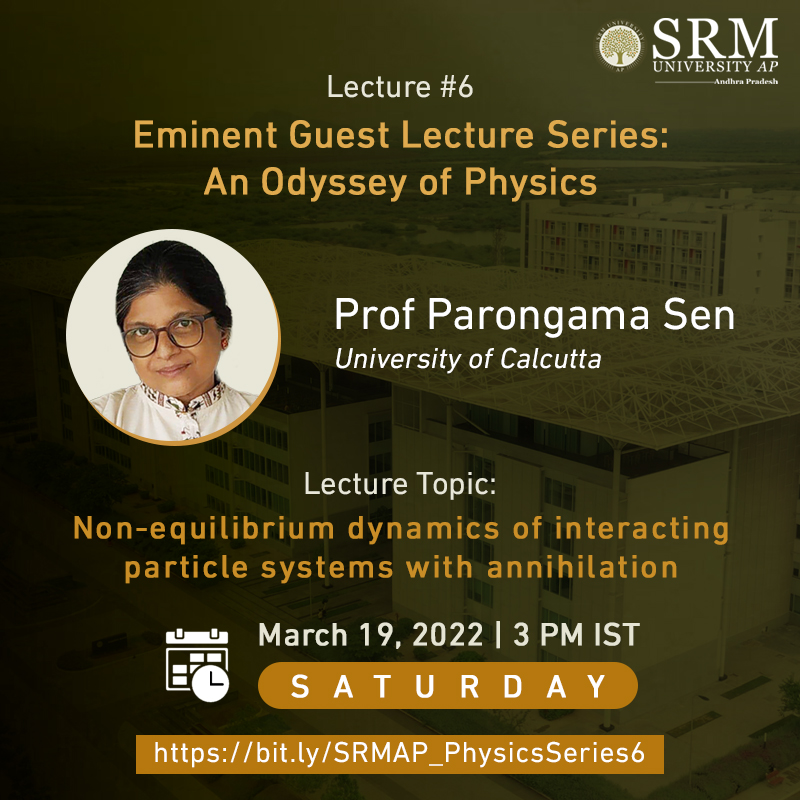SRMAP Departmental Events
- Non-equilibrium dynamics of interacting particle systems with annihilation March 14, 2022
The Department of Physics is going to host the sixth instalment of the Eminent Guest Lecture Series: An Odyssey of Physics on March 19, 2022, at 03.00 PM IST with Prof Parongama Sen from the University of Calcutta as the keynote speaker. Dr Sen will be speaking on” Non-equilibrium dynamics of interacting particle systems with annihilation”.
Prof Parongama Sen has been teaching at the University of Calcutta as Professor since 2008. She received her PhD from Saha Institute of Nuclear Physics, Calcutta in 1993. She was also awarded APS-IUSSTF Professorship in 2012-13. Her research interests include statistical physics: phase transitions and critical phenomena in magnetic systems, networks, quantum systems, percolation etc. and dynamical phenomena in complex physical and social systems.
Non-equilibrium dynamics of interacting particle systems with annihilation
There has been tremendous research activity on the evolution of systems comprising of interacting particles in Statistical Physics over the last few decades. This lecture particularly considers those systems in which the particles (also called reactants) may get annihilated instantaneously upon contact or merged as a single species, both of which reduce the particle number. Some of these processes have a one-to-one correspondence with the coarsening dynamics of spin systems and play an important role in the development of non-equilibrium Statistical Physics.
Usually, one considers diffusive motion when the particles move freely, and some known results in this context will be discussed. Here, the speaker notes that the dynamics may also be considered in terms of population densities rather than individuals and examples include models of epidemic spreading.
Finally, she will focus on a model in which the reactant particles are driven by a dynamic bias that radically changes the scaling behaviour of the relevant quantities. The results will be presented for such a system, highlighting the microscopic dynamics, which reveal a crossover behaviour.
Register here for an informative session with Prof Parongama Sen.
- Workshop on Applied Rheology March 10, 2022
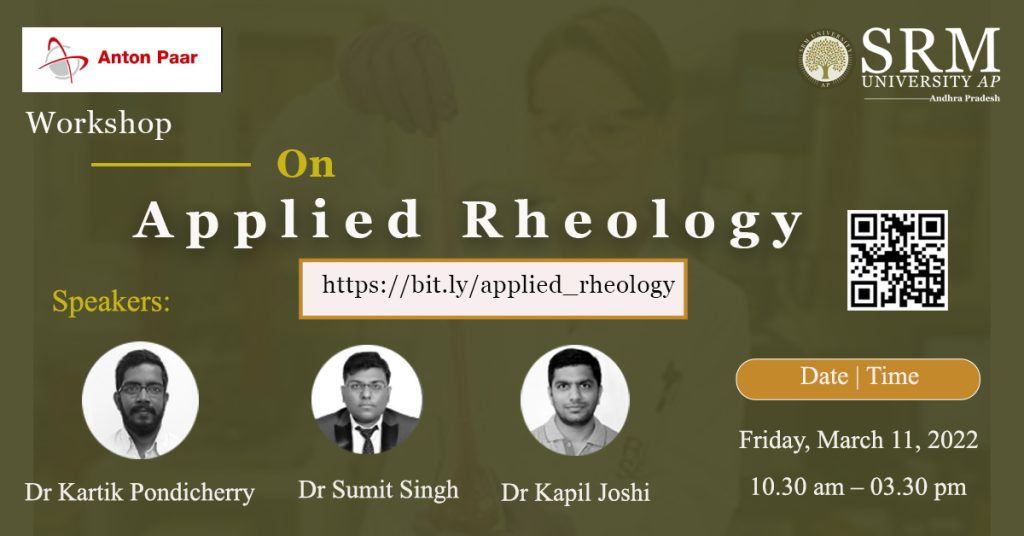 Department of Civil Engineering has organised a workshop on Applied Rheology on March 11, 2022, at 10:30 AM (IST). Dr Kartik Pondicherry, Dr Sumit Singh and Dr Kapil Joshi, Application Specialists at Anton Paar, India, will be delivering the keynote addresses.
Department of Civil Engineering has organised a workshop on Applied Rheology on March 11, 2022, at 10:30 AM (IST). Dr Kartik Pondicherry, Dr Sumit Singh and Dr Kapil Joshi, Application Specialists at Anton Paar, India, will be delivering the keynote addresses.About this workshop:
Rheology deals with the deformation and flow behaviour of materials. Rheology, in terms of viscosity and viscoelastic behaviour, plays a significant role in many aspects of production, processing, transportation, and consumption of materials and products. The current workshop deals with the basics of rheology with a particular focus on the real-life application of rheology in asphalt, polymers and the food industry.
Speakers:
Dr Kartik Pondicherry pursued his Doctorate in Tribology from the University of Leoben in Leoben, Austria. He started his professional journey at Anton Paar in Graz, Austria. With over a decade of experience in the field of tribology, Dr Pondicherry moved back to India to manage the tribology portfolio in the country. He joined Anton Paar India as a Technical Manager for Rheology. Over the past few years, Dr Pondicherry has conducted numerous seminars and training for people from both academia and industry in different parts of the globe.
Dr Sumit Singh completed his PhD on “Thermal and Rheological study on Polymer modified Bitumen” from IIT Roorkee. After his doctoral studies, he joined the Characterization Division at Anton Paar, India as an Application Specialist. His interest in Rheology lies in its wide range of applications and modularity. Dr Singh is experienced in organising training sessions and webinars. He also conducts lab sessions on various applications of rheology such as polymers, asphalt, DMTA, gels etc. His scientific papers have been presented in numerous National & International forums. He has further received a few academic accolades in his research career.
Dr Kapil Joshi is presently working as an Application Specialist for Rheology & Particle Characterisation in Anton Paar, India. He pursued his doctoral studies in Materials Science in the area of semiconductors & ion beams from the University of Mumbai. After that, he carried out post-doctoral work at the Tata Institute of Fundamental Research (TIFR, Mumbai). His area of research was organic LEDs & solar cells. During his previous engagements, he worked on techniques such as electron microscopy, atomic force microscopy & nanoindentation. In Anton Paar India, he is responsible for analysing samples, delivering talks & conducting training sessions on various aspects of rheology & particle characterisation in the area of polymers, pharma formulations, powders etc.
Convener:
Dr GVP Bhagat Singh, Assistant Professor & Head, Department of Civil Engineering, SRM University-AP, Andhra Pradesh
Co-Conveners:
Dr KVNS Ravi Teja, Assistant Professor, Department of Civil Engineering, SRM University-AP
Dr Thainswemong Choudhury, Assistant Professor, Department of Civil Engineering, SRM University–APRegister here to join the workshop.
Continue reading → - Women’s day with the IEEE-SRM student branch March 5, 2022
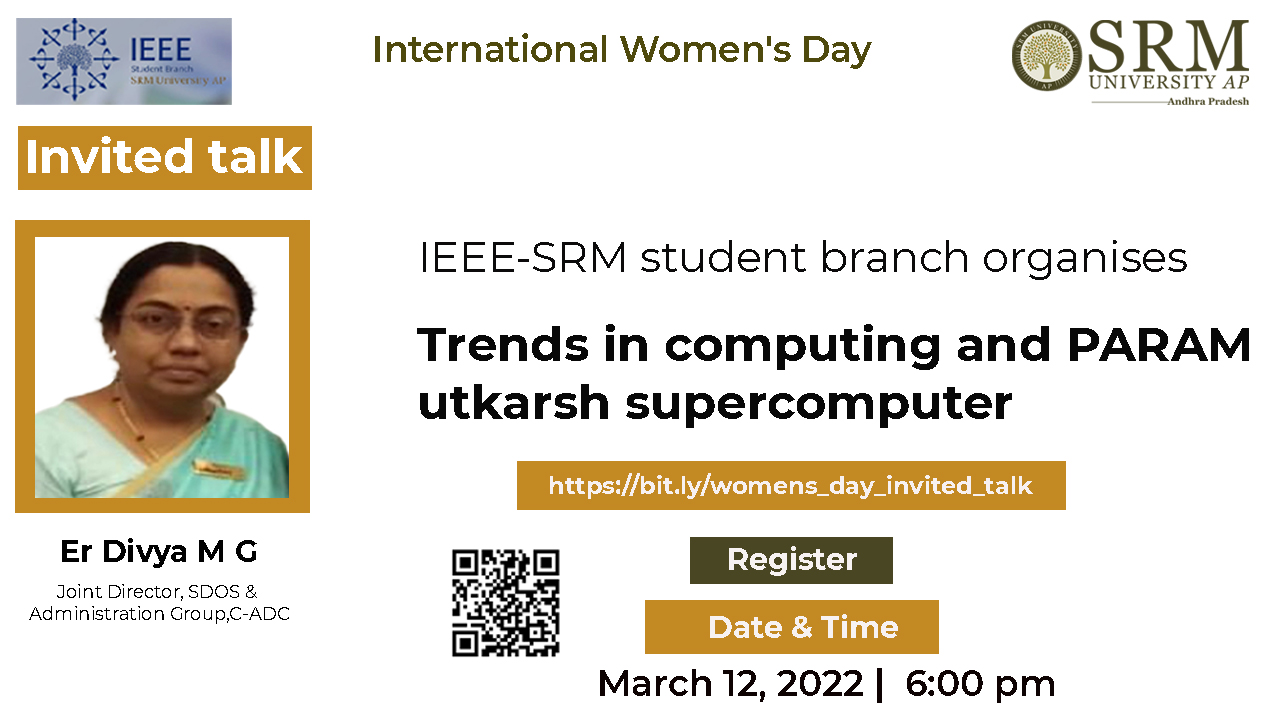
In collaboration with IEEE-SRM Student Branch, SRM University-AP, Andhra Pradesh, is organising an invited talk to mark “Women’s Day 2022”. We have invited Er Divya M G, Joint Director, SDOS & Administration Group, at Centre for Development of Advanced Computing (C-DAC), Bangalore as the guest speaker. She will elucidate on the topic “Trends in computing and PARAM utkarsh supercomputer” on March 12, 2022, at 6.00 pm.
PARAM Utkarsh is a High-Performance Computing System run by the National Supercomputing Mission (NSM) of the Indian government at C-DAC in Bangalore. As a cloud service, this system provides Artificial Intelligence over Machine Learning and Deep Learning frameworks.
Women’s day aims to promote a gender-neutral society. This year’s theme is #BreakTheBias. Bias, whether intentional or unconscious, makes it difficult for women to advance in their personal and professional life. International Women’s Day (March 8) is a worldwide celebration of women’s social, economic, cultural, and political accomplishments. The day also serves as a rallying point for women’s equality. Er Divya, recipient of the “2020 IEEE Women in Engineering Inspiring Members of the Year Award”, is the befitting speaker of the occasion.
Join this inspiring session on March 12, 2022, at 6.00 pm.
Continue reading → - Digital Twins : By Professor Perumal Nithiarasu February 25, 2022
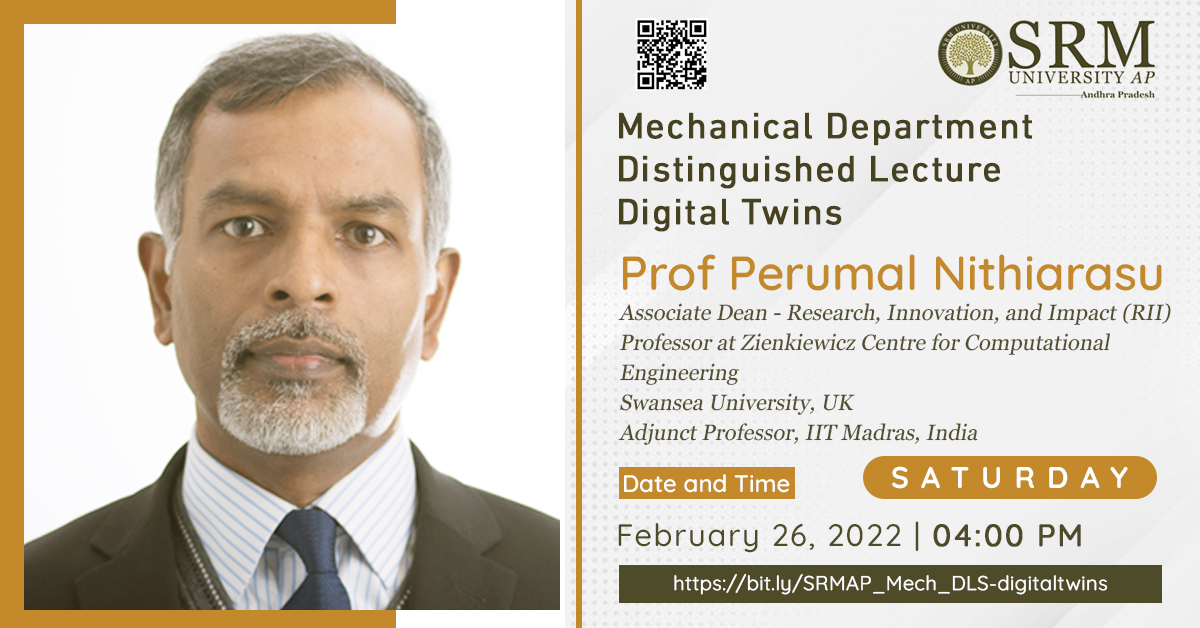 The Department of Mechanical Engineering is bringing forth the next edition of Mechanical Department Distinguished Lecture with Professor Perumal Nithiarasu,Associate Dean – Research, Innovation, and Impact (RII), Professor at Zienkiewicz Centre for Computational Engineering, Swansea University, UK, and Adjunct Professor, IIT Madras, India.
The Department of Mechanical Engineering is bringing forth the next edition of Mechanical Department Distinguished Lecture with Professor Perumal Nithiarasu,Associate Dean – Research, Innovation, and Impact (RII), Professor at Zienkiewicz Centre for Computational Engineering, Swansea University, UK, and Adjunct Professor, IIT Madras, India.Date: February 26, 2022 (Saturday)
Time: 4.00 pm IST
About the Speaker:
Perumal Nithiarasu is the Professor and Associate Dean for Research, Innovation and Impact in the Faculty of Science and Engineering. Previously he served as Director of Research in the College of Engineering, Swansea University (2018-2021). He was also a Deputy Head of the College of Engineering and held the position of Dean Academic Leadership (Research Impact) at Swansea University between 2015 and 2021.
Dr Perumal Nithiarasu served as the Head of Zienkewicz Centre for Computational Engineering for 5 years (2013-2018). He has also served in several SU committees including HR Research Working Group as a chair leading the HR excellence award submission and REF14 impact and appeal committees as a member. He has proposed and implemented a public lecture named after the father of the finite element method, Professor O.C. Zienkiewicz.
A Mechanical Engineer by training, Dr Perumal Nithiarasu has extensive experience in teaching various disciplines. His research areas of interest include computational fluid dynamics/biomedical engineering and recently AI. He has been working in these areas for more than 25 years and has published a large number of articles and books (h-index, 40 – google scholar).
Well known internationally for his work, Dr Perumal Nithiarasu was awarded the Zienkiewicz silver medal of ICE London in 2002, the ECCOMAS Young Investigator Award in 2004 and the prestigious EPSRC Advanced Fellowship in 2006. The group led by Dr Nithiarasu currently consists of 10 academic staff, more than 20 post-docs and research students.
Dr Perumal Nithiarasu currently co-chairs 2 international conferences, including the well-known Computational and Mathematical Biomedical Engineering series (CMBE series, www.compbiomed.net) founded by him. He is also the founding editor in chief of the International Journal for Numerical Methods in Biomedical Engineering, published by Wiley-Blackwell. Dr Perumal Nithiarasu was elected to the fellowship of the Learned Society of Wales in 2018.
Abstract of the Talk:
Building digital twins (DTs) of engineering systems and processes is a real challenge. While the potential offered by DTs in designing, monitoring and decision making is hugely appreciated by researchers, building a comprehensive DT requires a strongly multidisciplinary approach. This lecture will discuss the definitions, classifications, and challenges of constructing a DT. The talk will try to define DTs suitable for engineering applications. The discussion will also focus on the availability or lack of tools for building DTs. In addition, the talk will also cover various topics such as data, AI, and physics-based models. Finally, the lecture will use some energy and healthcare examples to provide context to the DTs.
- Reading Skills: Insights from a Historian February 14, 2022
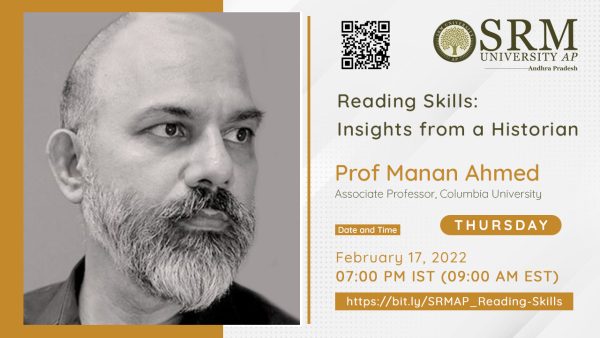 Reading means something different for everyone. Each person develops their reading skills as per their requirements. Some read to find information while others read to mine information. Some read to learn, and some read to laugh, some read to be entertained and some to escape. From reading the labels on new products to newspapers to novels, the objectives of reading can be plenty.
Reading means something different for everyone. Each person develops their reading skills as per their requirements. Some read to find information while others read to mine information. Some read to learn, and some read to laugh, some read to be entertained and some to escape. From reading the labels on new products to newspapers to novels, the objectives of reading can be plenty.The Department of English is bringing Prof Manan Ahmed – Associate Professor, Columbia University to shed light on the reading approach and the reading skills of a historian in an interesting and interactive session.
Date: February 17, 2022
Time: 07.00 pm IST
About the Speaker:
Manan Ahmed, Associate Professor of History at Columbia University in the City of New York, is a historian of South Asia and the littoral western Indian Ocean world from 1000-1800 CE. His areas of specialisation include intellectual history in South and Southeast Asia, critical philosophy of history, colonial and anti-colonial thought. Two of his books The Loss of Hindustan: The Invention of India (2020) and A Book of Conquest: The Chachnama and Muslim Origins in South Asia (2016) are published by Harvard University Press.
Abstract:
“Reading Skills” brings to mind dreadful reading comprehension passages given in schools and courses in communication skills. However, reading is much more about finding answers to given questions. It is about finding the questions to ask of a passage, blog, article, literary texts, and historical texts. In this talk and interaction, Prof Manan Ahmed would walk us through a historian’s approach to reading. The programme is intended to be a part of the department’s larger initiative to organise interactions around “Language and Society” to address all kinds of conversations about language, communication, writing, speaking, thinking, and at a deeper level, about connecting with others.
Click here to join this exclusive session and develop an insight on reading through the experiences of our esteemed speaker.


